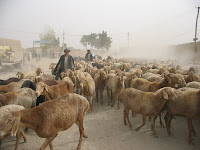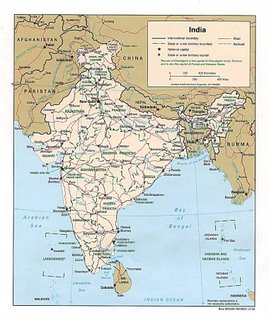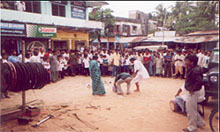Getting ready to go to Bamiyan… it’s a bit dicey because we are driving. There are two routes: the southern way (paved) goes through Wardak which is definitely to be avoided if you are foreign or Hazara since it’s Pashtun and thus potential Taliban territory. The northern route (unpaved) bumps along through mountain passes on roads of rubble and sheer cliffs, but passing only has one danger area, the Pashtun villages in the Ghorban valley. This is not a road really; this is a rugged path carved by hundreds of years of donkeys patiently hoofing their way through the precipices, head down, loaded with every sort of tradable item. These donkeys are relentless, dauntless. We are passing them continuously on the path – they nimbly trot through the rubble as we go bouncing along, rattling teeth and brains. What do donkeys think? Do they think? No matter how huge the load, they just keep walking.
The dangers on this precipitous journey run from robberies to kidnappings, and we aren’t too keen on either. So the entire ride with our non-English speaking driver we are asking if we are approaching, in, or leaving this notorious Ghorban valley. Nothing like a 7 hour scary ride to improve one’s language skills, and my Dari is improving daily. I’ve learned khatar = danger, and checkpoint which has a long name but everyone knows ”checkpoint.”
Passing through one town in the long ride to Bamyan, we pass a sheep being slaughtered, its head severed, still shaking and quivering – still alive. A man stands by casually. Sheep are food; sheep are life. Death is a casual event. Meat hangs in front of every butchery, a gory decoration to me, a vegetarian, but even a bit too vivid for meat-eaters who are used to packaged pieces of animals. A wheelbarrow full of hoofed feet stands by with another row of feet all neatly lined up fill the store window. Without the sheep, people could not live. I hear it’s really tasty, this mutton, so fresh, so tender!
Pulling into Bamyan is a little shock after Kabul. Most small cities (or large towns) are clusters of mud walled lanes shielding homes inside from prying eyes, punctuated by alleyways between them, and a few streets lined with rows of small, open-front shops. Bamiyan has one long street of bazaar that welcomes you into the town. It is the town. There are a few cross streets and a lovely river traversing the town, and then endless farms and mud walled enclaves – all in a flat sprawl between the mountains.
But the most prominent feature in Bamyan is that amazing rocky façade of mountain dotted with caves across its impossibly sheer face, and the two huge empty arches where stone Buddhas once towered until the Taliban blew up these treasured statues. There it stands, the huge wall of caves and niches, right there, visible from anywhere in the city the minute you enter, and right there at the end of my block. It’s not hidden, or a bus ride away, or behind a fence – it’s there – the biggest thing in town. It defines the town in more than reputation but in situation. The wall is omnipresent. Farmers are busy at its base tending to crops just as they’ve done for centuries; herds of sheep or goats traipse along looking for edibles oblivious to this majestic masterpiece of nature and man.
So what did the town do as the Taliban destroyed the Buddhas that stood watching over them for a millennium? Did they all come out to watch? Did they have a protest? Chain themselves to the mountain? No… because before the Taliban blew up the statues, they proceeded to massacre most of the Hazara in the area, going door to door and killing every male, and causing a mass exodus of families over the snowcapped mountains. Babies froze, the elderly faltered, men dressed in burqas, women carried their children until they dropped. Who was left in town to dispute the slaying of statues?
Bamyan is the safest province in Afghanistan (once you get there) and one of the poorest (hence our presence here). The locals feel that, since this is the homeland of the Hazara, the government ignores them and isn’t sending them the money for teachers, schools, training programs, etc. Sounds familiar. So the new idea in Bamyan is eco-tourism. Several key development organizations are assisting in staff training and hotel building, and establishing tour groups and media to bring in tourists. Perhaps in a year or two a kiosk selling souvenirs will open at the mountain base, and then a few more, and then a billboard… but, then again, you can’t keep a valley alive selling ladies fingers (aka okra or bamya in Dari).
I hope that tourism won’t bring those elements that plague Kabul: too many cars, unfettered pollution, pickpockets, beggars, high prices, random dangers for foreigners, etc. Already, we were accosted – or jubilantly surrounded – by a swarm of kids as we passed a makhtab (school). The second they saw us, they ran at us screaming like we were Santa Claus. But there was savvy behind the mania. The children (girls and boys) mimed putting on lipstick – clear message: give me lipstick. And they cling, and pinch, and grab your hat and bags, and yell “qalam” (pen) and “bakhshesh” (gift or tip). Someone has been giving children lipstick and pens. Children are the most needy, the least able to survive… but the mass attack was unnerving. We have experienced this before: after a show in a refugee camp in Macedonia during the Kosovo war, I was literally carried off by the sea of excited kids, as I waved madly at Michael who was similarly being swept away in the other direction. We were suddenly the candy they never tasted.
Speaking of Santa, I see Christmas trees here and there – decorated with shiny balls and all – right here in Afghanistan. “We like Christmas here,” they tell me. Of course, why not? The Christmas event is noted in the Quran along with the virgin birth and angelic visits.
One more word on Bamiyan… the province – the only one with a woman governor – is not as well served by humanitarian organizations as are the areas besieged by war. Many in Bamyan suggest that it would be a better strategy to improve the safest areas, such as Bamyan and Badakhshan, to serve as models for the other provinces. Give Bamyan good schools and hospitals, provide services in the mountain villages, improve agricultural methods and transportation, and let the other provinces get the message that peace attracts aid, not violence. Of course, the counter arguments are many. Every battle-weary village in Ghazni, Qandahar, Helmand or Wardak wants peace. Only the handful of troublemakers that are bought and paid for by another handful of wealthy outsiders who profit from war want its continuance. What family in Uruzgan wants a life of fear and insecurity for their children? None. Some of the most conservative areas may share traditions with their Talib cousins, but no one wants bombs at their son’s wedding or daughter’s school. Families are alike the world over and bemoan their lost children.
from Joanna's Afghan journal


 The workshops have started well and we are more than busy: the theatre group in the morning, the ‘magic box’ children in the afternoon, and a class for older male students some evenings, as well as performances of “A Tale of Two Kites” at local schools and orphanages.
The workshops have started well and we are more than busy: the theatre group in the morning, the ‘magic box’ children in the afternoon, and a class for older male students some evenings, as well as performances of “A Tale of Two Kites” at local schools and orphanages.











